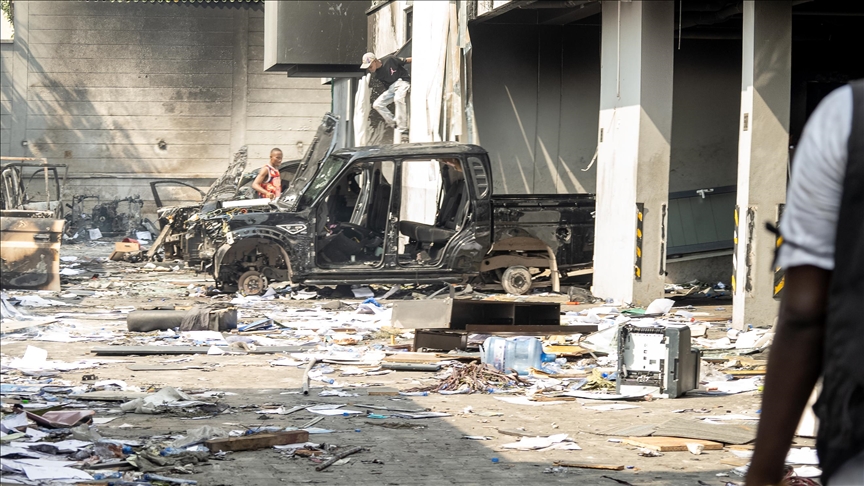Experts hope new DR Congo-Rwanda peace deal will ease humanitarian crisis
More than 6.7M internally displaced across Congo, according to UN figures
 M23 rebels gather for large-scale protests as they set on fire the Rwandan, French, Belgian and Kenyan embassy buildings and loot some shopping centers during anti-Rwandan demonstrations allegedly supported by the rebel group March 23 Movement (M23) and rebels in Kinshasa, the capital of the Democratic Republic of Congo on January 28, 2025.
M23 rebels gather for large-scale protests as they set on fire the Rwandan, French, Belgian and Kenyan embassy buildings and loot some shopping centers during anti-Rwandan demonstrations allegedly supported by the rebel group March 23 Movement (M23) and rebels in Kinshasa, the capital of the Democratic Republic of Congo on January 28, 2025.
JOHANNESBURG
Experts expressed hope that the new peace deal between the Democratic Republic of Congo and Rwanda to end the decades-long conflict in eastern Congo will help ease the dire humanitarian crisis in the region.
More than 6.7 million people are internally displaced across Congo, according to UN figures released late last year.
Many Congolese nationals have fled to seek refuge in neighboring countries such as Uganda, Rwanda, Tanzania, and Burundi, amid dwindling donor aid, which has pushed the UN World Food Program (WFP) to reduce food rations or scrap them in some countries.
“Hundreds of thousands of internally displaced people and refugees who have fled the conflict in Congo will certainly return home. People have been suffering as a result of this conflict, especially women and children,” Harold Acemah, a political analyst and retired Ugandan diplomat, told Anadolu.
Clashes in eastern Congo between M23 rebels and government forces had displaced at least half a million people and killed more than 3,000 as of this February, according to the Africa Center for Strategic Studies.
The conflict has disrupted the delivery of food, medicine, and humanitarian materials. Many places remain inaccessible due to the lack of security, leaving displaced people without necessities.
Acemah said the peace deal, signed on Friday in Washington, is a positive development that should be welcomed by all members of the African Union. ‘‘They should play a role for it to be implemented,’’ he noted.
The US-brokered deal is based on the fundamental principles established in a declaration of principles signed on April 23 between the two countries.
It responds to Congo’s key concerns, including respect for its territorial integrity, the disarmament of armed groups, and the implementation of measures to restore lasting stability in the region.
It provides for a cessation of hostilities between the two armies.
Congo Foreign Minister Therese Kayikwamba Wagner, who signed the deal, welcomed the initiative, calling it not only a diplomatic victory, but a triumph for the Congolese people.
Olivier Nduhungirehe, her Rwandan counterpart, said the agreement is based on the commitment to irreversibly and verifiably end state support for the Rwandan militia, the Democratic Forces for the Liberation of Rwanda (FDLR), and associated militias.
Safe return of refugees
Acemah hopes that if the deal is implemented, it will enable the safe return of millions of Congolese living in internally displaced peoples camps to their homes, as well as those outside Congo.
He is optimistic the deal will be respected because of the involvement of the US, a superpower, and hopes it allows the safe delivery of humanitarian aid to those in need.
“All countries in the region should encourage DR Congo and Rwanda to respect the agreement for the benefit of their citizens and the region,” he said.
Optimistic but cautious
Buchanan Ismael, a political scientist at the University of Rwanda, told Anadolu that refugees are expecting both parties to respect the agreement so that they can return home.
He said if the deal is to be respected, the government of Congo should commit to welcoming thousands of refugees who are Kinyarwanda speakers who were previously denied entry and labeled as Rwandans.
“It is up to the DRC government to be ready to accept welcoming them inside Congo and take care of them,” he stated.
Ismael said many peace negotiations have been held, including the Luanda Process, Nairobi, and Doha, but none have been implemented or succeeded.
“I am very pessimistic that the Washington peace agreement, too, does not put much emphasis on it, then we will be talking about another story,” he told Anadolu.
He said if the deal is respected based on agreements and commitments from both parties, then the refugees may have a chance to return home.
“I believe that many of the refugees are expecting that both parties will respect what they have signed for,” he noted.
Reduction of violence
“We are hopeful that the peace deal will lead to a reduction of violence in the Kivu region, certainly, but it’s too early to judge because there have been past negotiations for peace deals in the past that did not deliver much. So we are optimistic but cautious,” Stephan Goetghebuer, a program manager with the Doctors Without Borders (MSF) medical charity, told Anadolu.
He said if the agreement leads to disarmament of armed groups in the region, then there will be less violence, especially sexual violence, which is rife in Kivu.
Peace would enable humanitarian groups to serve affected communities, he said, adding that Doctors Without Borders has been respected by all groups that are fighting, and has not found much difficulty accessing areas where people need help, only during heavy fighting.




